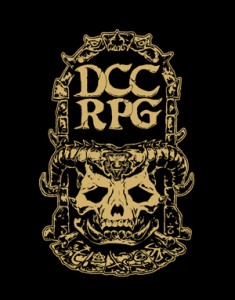 Over the weekend Erik Tenkar posted about why he liked Dungeon Crawl Classics and noted it certainly wasn’t the neverending spell tables. This spurred another post from Wayne Rossi on his blog about DCC RPG, tables, and the Pareto principle. Both good posts which led to two different conclusions – one person finding magic in the game and the other turned off by the tables.
Over the weekend Erik Tenkar posted about why he liked Dungeon Crawl Classics and noted it certainly wasn’t the neverending spell tables. This spurred another post from Wayne Rossi on his blog about DCC RPG, tables, and the Pareto principle. Both good posts which led to two different conclusions – one person finding magic in the game and the other turned off by the tables.
Tables
Dungeon Crawl Classics RPG does have a lot of tables. Tables for spells, tables for critical hits, tables for fumbles, tables for mercurial magic, tables for disapproval, and so on and so on. Tables are an integral part to DCC RPG. Tables bring the randomness. Tables occasionally bring the “over the top” results. Tables are what help keep DCC RPG players on their toes.
When I first heard about DCC RPG and all the tables I was pretty skeptical too. In fact, I ended up with the DCC RPG rulebook because I kept hearing great things about the art in it. I initially bought it for the art, but then after reading it thought the game sounded like a lot of fun. After playing in a one-shot online, I was hooked.
The focus of Wayne’s articles is on the spells and accompanying tables. From where I sit I am less concerned with applying Pareto principles and more interested in whether the spell tables add fun to the game for me.
Closer Look at Spell Tables
For sake of discussion I am going to limit my post to the spell tables, but a lot of my comments will likely be applicable to many of the tables in DCC RPG. But let’s take a look the spell tables.
I think the tables are *where* DCC RPG gets it magic from. The spell tables lead to the unpredictability of the game. This unpredictability creates the feeling of the unknown. This unknown is what sparks the magic for some of us who have been playing RPGs for a long time.
Let’s take the magic missile spell. Depending on edition of D&D, we all know magic missile is going to automatically hit and do 1d4+1 points of damage. As the caster’s level goes up, the more missiles the caster unleashes. That is how the spell works today, it is how it works tomorrow, and how it will work the day after that.
When we were new to the game, that in and of itself was enough to be new and treading that line on the edge of the known. As decades have gone by, magic missile gets a little stale. Our wizards have cast it hundreds of times with the same results.
Enter DCC RPG. Now magic missile has a unique table covering the possible results. Now my wizard casts magic missile. I roll a quick 1d20+caster level+intelligence modifier and I step into the unknown again! Now my magic missile could do anywhere from 1 point of damage to 4d12+ caster level of damage to multiple missiles causing 1d10+ caster level of damage. The result changes each time! Magic missile suddenly has become fun again due to this unpredictability.
Each spell has its own table, because each spell is unique in its results. Trying to apply a single table to every spell would ultimately end up being too generic in the long run and steal from the power of specific spell tables.
Each spell table in DCC RPG is interesting. Actual play in my groups indicates that rolling random results on spell tables has everyone at the table anxiously awaiting the result. Will the spell fizzle? Will it do some trivial amount of damage? Or will it be a battle changer and finally swing the tide the party’s way? These are questions asked each time a spell is cast. I think this recurring unknown is what gives DCC RPG its magic.
Tables With Purpose
A table for the sake of having a table is not a good thing. But the tables in DCC RPG are there with a purpose. A purpose of adding randomness into the game. Randomness that adds to the unknown. Unknown that aims (and succeeds in my opinion) to rekindle that magic we saw in the game so many years ago.
